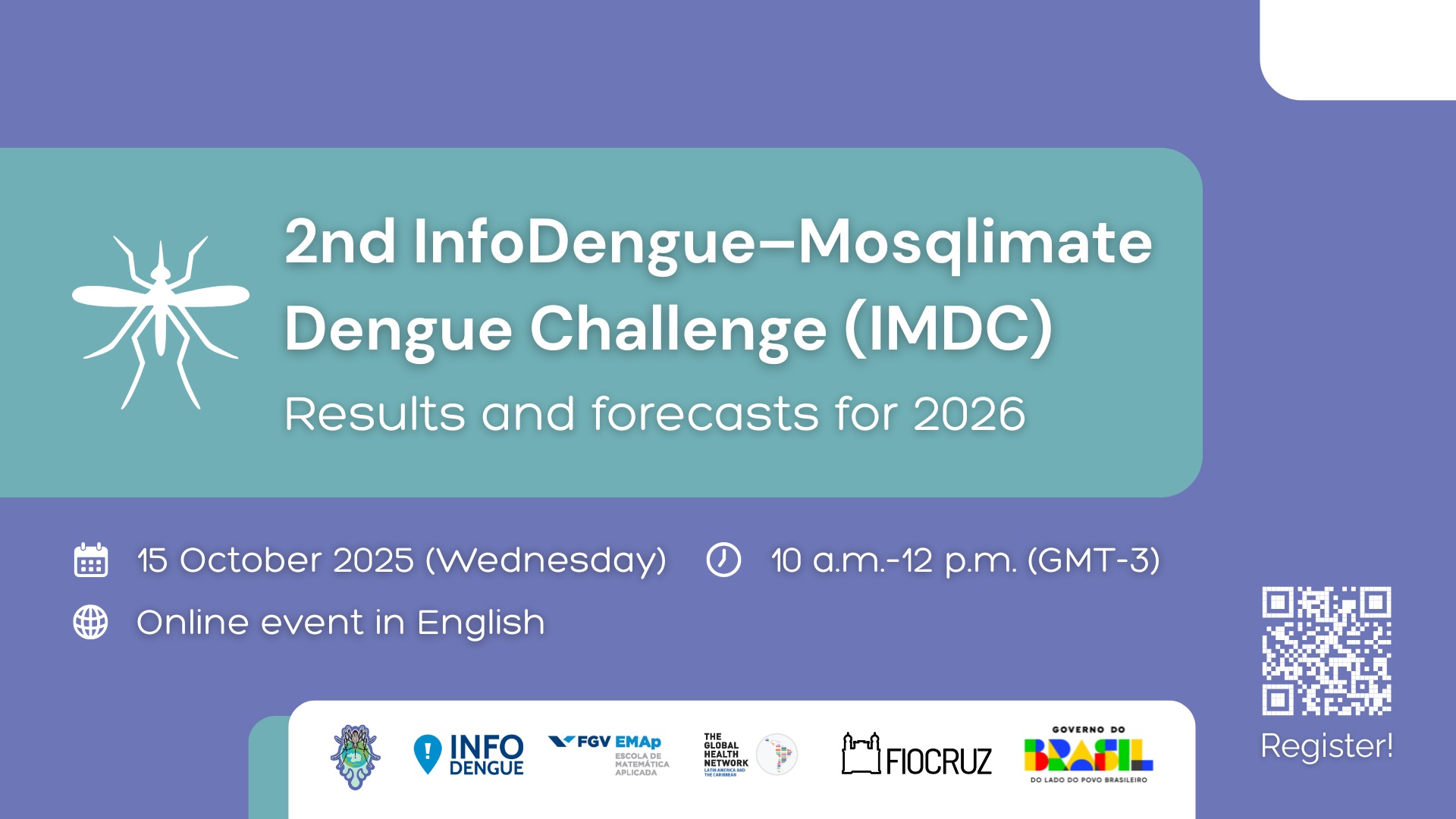International challenge presents innovative model for dengue case forecasts in Brazil for 2026
A group of 52 researchers from South Africa, Germany, Saudi Arabia, Brazil, Spain, the United States, Italy, and the United Kingdom worked in parallel in 2025 to develop predictive models of dengue for all Brazilian states, focusing on forecasting dengue epidemics in Brazil for 2026.
The initiative, called the Sprint, resulted in an ensemble model that brings together the main projections of dengue cases. This approach, considered innovative in the field of data science, can strengthen the accuracy of forecasts and thus more effectively support decision-making by the Ministry of Health in Brazil.
Webinar to present the dengue case forecasts model
The Sprint’s collective model will be presented by the Mosqlimate team in the webinar “2nd InfoDengue–Mosqlimate Dengue Challenge (IMDC) – Results and forecasts for 2026”, on 15 October 2025, at 10:00 Brasília time (GMT-3). Registration is open until the day of the event [here].
What is IMDC and how does it contribute to dengue forecasts
The InfoDengue–Mosqlimate Dengue Challenge (IMDC) is an international initiative of the InfoDengue and Mosqlimate projects, in partnership with Fiocruz and Fundação Getulio Vargas (FGV), established in 2024. The initiative is supported by The Global Health Network Latin America and the Caribbean (TGHN LAC) and the Scientific Computing Programme at Fiocruz (PROCC), part of the Vice-Presidency of Communication, Information and Education at Fiocruz.
The IMDC’s main objective is to integrate epidemiological, demographic and climate information to improve the forecasting of dengue epidemics and support the formulation of public health policies.
Participating institutions in the dengue forecast Sprint
A total of 15 research teams took part in the Sprint with 19 different predictive models of dengue cases in Brazil. The Brazilian institutions were (in alphabetical order): Fiocruz, Fundação Getulio Vargas (FGV), Instituto de Matemática Pura e Aplicada (IMPA-Tech), Universidade do Estado do Rio de Janeiro (UERJ), and Universidade Federal do Rio Grande do Norte (UFRN).
The international universities and research centres were: Centre for Epidemic Response and Innovation (CERI), South Africa; Robert Koch Institute, Germany; King Abdullah University of Science and Technology (KAUST), Saudi Arabia; Barcelona Supercomputing Center (BSC), Spain; Cornell University and Oklahoma State University (OSU), United States; Institute for Scientific Interchange (ISI), Italy; and Imperial College London (ICL), United Kingdom.
Next webinar on dengue epidemic forecasting in Brazil
In addition to the 15 October webinar, InfoDengue and Mosqlimate will hold another event on 31 October, “Preparing for the 2026 dengue season: perspectives from predictive models”, focusing on the final projections from the model that will be presented on the 15th.
Event details
📅 15 October 2025 (Wednesday)
🕙 10:00–12:00 Brasília time (GMT-3)
🌐 Online event, in English
🔗 Registration [here]
Invited speakers
- Flavio Codeço Coelho – Professor at FGV’s School of Applied Mathematics, researcher in epidemic modelling and complex data analysis.
- Eduardo Araújo – Researcher in training at FGV, with experience in mathematical modelling applied to infectious diseases.
- Fabiana Ganem – Researcher at FGV, focused on epidemiological data analysis and predictive health modelling.
🔗 More information about IMDC: https://sprint.mosqlimate.org/
🔗 Click here to know more about the IMDC webinar
Written by Luisa Picanço (TGHN LAC/Fiocruz)

